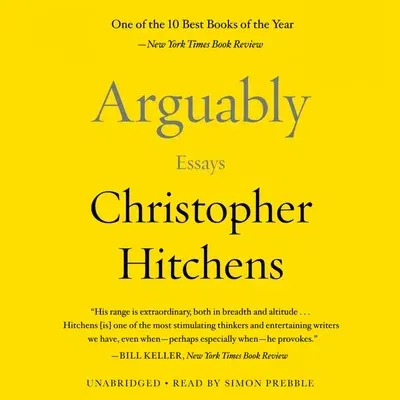"All first-rate criticism first defines what we are confronting," the
late, great jazz critic Whitney Balliett once wrote. By that measure,
the essays of Christopher Hitchens are in the first tier. For nearly
four decades, Hitchens has been telling us, in pitch-perfect prose, what
we confront when we grapple with first principles-the principles of
reason and tolerance and skepticism that define and inform the
foundations of our civilization-principles that, to endure, must be
defended anew by every generation.
"A short list of the greatest living conversationalists in English,"
said The Economist, "would probably have to include Christopher
Hitchens, Sir Patrick Leigh-Fermor, and Sir Tom Stoppard. Great
brilliance, fantastic powers of recall, and quick wit are clearly
valuable in sustaining conversation at these cosmic levels. Charm may be
helpful, too." Hitchens-who staunchly declines all offers of
knighthood-hereby invites you to take a seat at a democratic
conversation, to be engaged, and to be reasoned with. His knowledge is
formidable, an encyclopedic treasure, and yet one has the feeling,
reading him, of hearing a person thinking out loud, following the
inexorable logic of his thought, wherever it might lead, unafraid to
expose fraudulence, denounce injustice, and excoriate hypocrisy. Legions
of readers, admirers and detractors alike, have learned to read Hitchens
with something approaching awe at his felicity of language, the oxygen
in every sentence, the enviable wit and his readiness, even eagerness,
to fight a foe or mount the ramparts.
Here, he supplies fresh perceptions of such figures as varied as Charles
Dickens, Karl Marx, Rebecca West, George Orwell, J.G. Ballard, and
Philip Larkin are matched in brilliance by his pungent discussions and
intrepid observations, gathered from a lifetime of traveling and
reporting from such destinations as Iran, China, and Pakistan.
Hitchens's directness, elegance, lightly carried erudition, critical and
psychological insight, humor, and sympathy-applied as they are here to a
dazzling variety of subjects-all set a standard for the essayist that
has rarely been matched in our time. What emerges from this
indispensable volume is an intellectual self-portrait of a writer with
an exemplary steadiness of purpose and a love affair with the delights
and seductions of the English language, a man anchored in a profound and
humane vision of the human longing for reason and justice.

